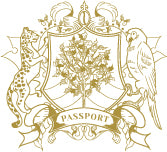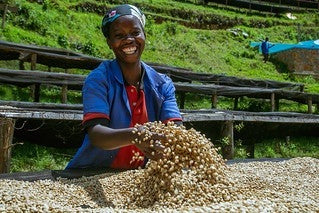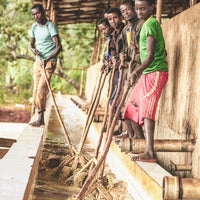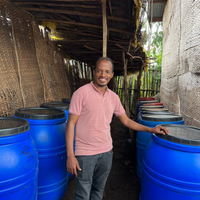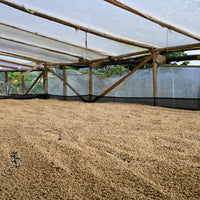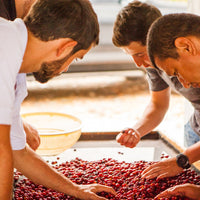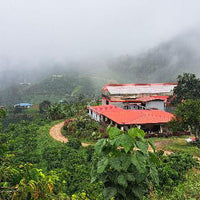Rwanda Macuba
Origin: Rwanda
Region: Nyamasheke
Altitude: 1685 meters above sea level
Washing Station: Macuba
Growers: 465 small holder growers
Variety: Bourbon
Process: Washed
Tasting Notes: Soft body with delicate and crisp acidity. Notes of milk chocolate, orange and peach.
Macuba washing station lies in the high-altitude hills of the Nyamasheke District. The station, which sits at 1,685 meters above sea level, receives coffee grown as high as 2,100 meters above sea level. The warm days and cool nights afforded by such high altitude helps cherry mature slowly and amass more sugars. The prime location is combined with exceptional agricultural practices, allowing Macuba to produce some of the best coffee in Rwanda.
Macuba is owned by Sucafina Rwanda and their farmer training program focuses on empowering smallholder farmers by fostering sustainable, high-quality coffee production.
Cherry is selectively handpicked by farmers and delivered to Macuba washing station. At intake, the station floats all cherry to remove any low-density cherry. Then, the high-density cherry is hand sorted to remove any visible defects.
After intake, cherry is pulped on a disc pulper before being placed in fermentation tanks to dry ferment for 20 – 24 hours.
Following fermentation, wet parchment is washed in clean water and placed in thin layers on tables to sun dry. Here, it is sifted regularly to ensure even drying. The parchment will be covered during the hottest times of the day and during periods of rain. On average, it takes 22 days for parchment to dry.
In concert with our sustainability partner, Kahawatu Foundation, Sucafina Rwanda (Rwacof) invests heavily in farmer training and good agricultural practices. Rwacof’s Farmer Field School shares information with all their producer partners about best agricultural practices, conservation tactics, the importance of picking only ripe cherry and more.
Furthermore, Rwacof is focused on improving the financial situation of the farmers with whom they work. Annual bonuses are always distributed once the coffee is sold. As part of Sucafina’s innovative Farmer Hub program, these second payments are deposited into zero-fee bank accounts. Second payments are typically given as cash. Through our Farmer Hub program, these bank accounts offer wider-reaching benefits, including more secure storage for their money and the opportunity to build a financial credit history & give them access to credit lines with better interest rates.
Above all, Rwacof's exceptional attention to detail during post-harvest activities ensures the best quality coffee possible. From the moment cherry enters the washing station until it is milled and bagged for export, Rwacof keeps stringent quality controls in place. They know, as we do, that high quality coffee is crucial for delivering benefit all along the supply chain.
Despite its turbulent history, today Rwanda is one of the specialty coffee world’s darlings – for good reason! Our sister company in Rwanda does an amazing job of bringing the best that Rwanda has to offer to roasters around the world.
German missionaries and settlers brought coffee to Rwanda in the early 1900s. Largescale coffee production was established during the 1930 & 1940s by the Belgian colonial government. Coffee production continued after the Belgian colonists left. By 1970, coffee had become the single largest export in Rwanda and accounted for 70% of total export revenue. Coffee was considered so valuable that, beginning in 1973, it was illegal to tear coffee trees out of the ground.
Between 1989 and 1993, the breakdown of the International Coffee Agreement (ICA) caused the global price to plummet. The Rwandan government and economy took a hard hit from low global coffee prices. The 1994 genocide and its aftermath led to a complete collapse of coffee exports and vital USD revenue, but the incredible resilience of the Rwandan people is evident in the way the economy and stability have recovered since then.
Modern Rwanda is considered one of the most stable countries in the region. Since 2003, its economy has grown by 7-8% per year and coffee production has played a key role in this economic growth. Coffee has also played a role in Rwanda's significant advancements towards gender equality. New initiatives that cater to women and focus on helping them equip themselves with the tools and knowledge for farming have been changing the way women view themselves and interact with the world around them.
Today, smallholders propel the industry in Rwanda forward. The country doesn’t have any large estates. Most coffee is grown by the 400,000+ smallholders, who own less than a quarter of a hectare. The majority of Rwanda’s coffee production is Arabica. Bourbon variety plants comprise 95% of all coffee trees cultivated in Rwanda.
